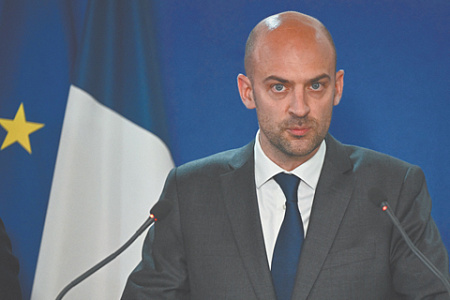
In a significant policy reversal, President Donald Trump has announced that the United States will send additional weaponry to Ukraine to bolster its defense capabilities. The move comes just a week after his administration partially suspended some military aid, sparking concerns among allies about a potential reduction in Washington’s support for Kyiv. Simultaneously, the European Union is preparing what French Foreign Minister Jean-Noël Barrot has described as its “harshest sanctions in three years” against Russia, in a coordinated effort to compel Moscow to halt its military operations.
According to Pentagon spokesman Sean Parnell, the new arms shipment was ordered directly by President Trump, though specific details about the types of weapons were not disclosed. During a meeting with Israeli Prime Minister Benjamin Netanyahu, Trump emphasized that Ukraine “must have the ability to defend itself,” highlighting a focus on defensive systems. He also expressed his continued frustration with the Russian leader, stating, “I am completely dissatisfied with President Putin.”
This decision follows a period of uncertainty. Last week, the U.S. paused deliveries of interceptor missiles for Patriot air defense systems, Stinger missiles, and munitions for the NASAMS system and F-16 fighter jets. Trump attributed the freeze to the need to verify U.S. stockpiles after his predecessor, he claimed, had “emptied the country.” However, reports from NBC News, citing anonymous sources, suggested the pause was a personal initiative by Pentagon chief Pete Hegseth and his deputy, Elbridge Colby, who reportedly advocate for redirecting U.S. resources to counter China in the Indo-Pacific.
International pressure appears to have played a role in the reversal. Axios reported that Trump promised Ukrainian President Volodymyr Zelensky in a July 4th phone call to “immediately” send 10 Patriot missiles. On the same day, German Chancellor Friedrich Merz urged Trump to resume the shipments and even offered to purchase Patriot systems from Washington for transfer to Kyiv. These discussions are expected to continue at an international conference on Ukraine’s reconstruction in Rome on July 10-11.
On the economic front, the EU is advancing a new sanctions package aimed at “exhausting Russia’s resources.” French Minister Barrot stated the measures are being coordinated with U.S. senators and are intended to push President Putin toward a ceasefire, claiming Russian strikes had increased fivefold since Trump proposed a 30-day truce. The new sanctions are expected to target Russia’s energy sector, specifically its oil export revenues, as well as financial entities in Russia and other countries.
The EU’s 18th sanctions package, which includes lowering the price cap on Russian oil and banning transactions with the Nord Stream pipeline project, is set to be reviewed by the Committee of Permanent Representatives (Coreper) in Brussels on July 9. Diplomats hope to persuade Slovakia, which had previously vetoed the measures, to grant its approval and ensure the bloc’s unanimity. In parallel, a bipartisan bill is expected to be considered in the U.S. this month, proposing what its authors call “crushing” sanctions, including a potential 500% tariff on all countries that purchase Russian energy resources.
Moscow has stated it will closely monitor these developments. Kremlin spokesman Dmitry Peskov remarked that the continued Western arms shipments “are not in line with attempts to facilitate a peaceful settlement” and instead contribute to prolonging the conflict. Regarding the impending sanctions, Peskov asserted that Russia has learned to “minimize the consequences of these illegal restrictions” and will apply its considerable experience to weather the new measures.
